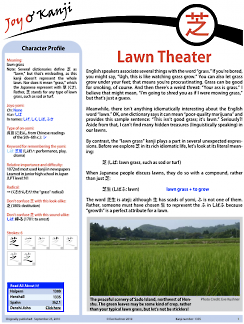芝
lawn grass
Kanji 1335
Thank you for visiting this Character Home Page. Below you'll find a synopsis of the essay. If you wish to read the full text, the PDF of the essay is available for FREE to the right.
The lawn grass kanji is intimately tied to the theater world. Knowing about 芝 therefore enables you to discuss the pretension and theatrical behavior that can characterize that culture. Learn how to use the word for "theater" to say that someone is faking something (such as illness).
Revision history:
May 21, 2021: pp. 9-10: Deleted the mochi example of an expression of envy because that saying is quite rare.
Jan. 1, 2020: I made an extremely small change to the translation of the sign on p. 10 and added that that sentence doesn't mean much of anything!
Dec. 23, 2019: I generally reformatted the essay to make it closer to the way we do them now. These are the most important changes:
- p. 1: Removed the statement that 芝生 is ateji. It's not because 生 can indeed have the kun-yomi ふ. Replaced that paragraph with a note that didn't really belong in the Character Profile section.
- p. 1: Caption: Made it clear that the photo likely shows a field of rice plants, not lawn grass.
- p. 2: Etymology Box: Replaced the old Henshall etymology with the new one and added a Kanjigen etymology.
- p. 6: Clarified that 一芝居 rarely stands alone.
- p. 7: Added a "Where We've Been" section and a link to the Kanshudo games. To make room for the new section, I added a page.
- p. 11: Added a photo that contributes new dimensions to the discussion of 芝, which is really exciting for me!
June 4, 2016: On page 4, I changed the definition of 芝居っ気 from "theatrical" to “a theatrical way" because 芝居っ気 is a noun.
Sept. 14, 2012: I added a photo to page 10.
Apr. 6, 2012: I fixed a typo. Also, I added a photo to page 9.



Comments